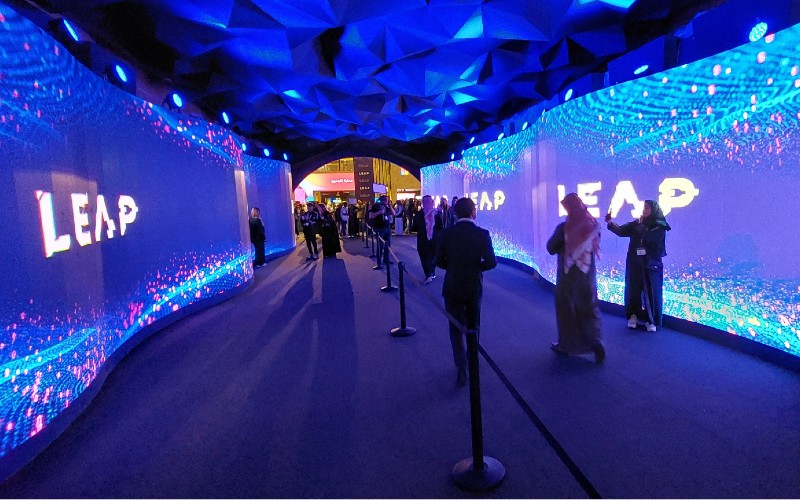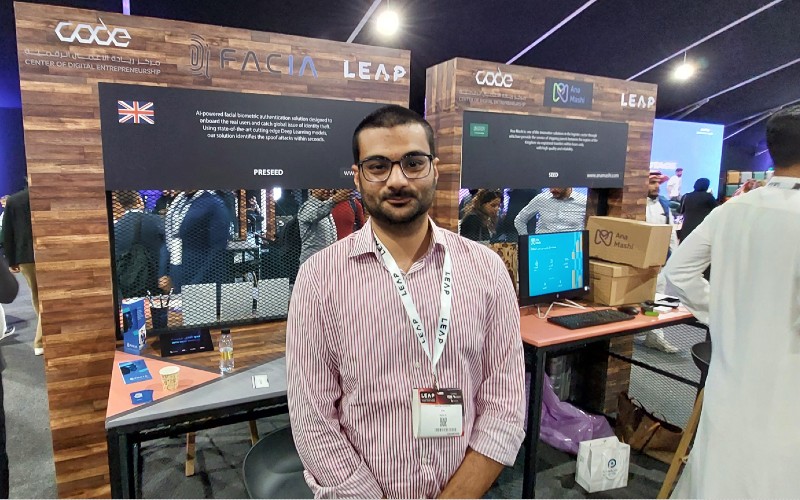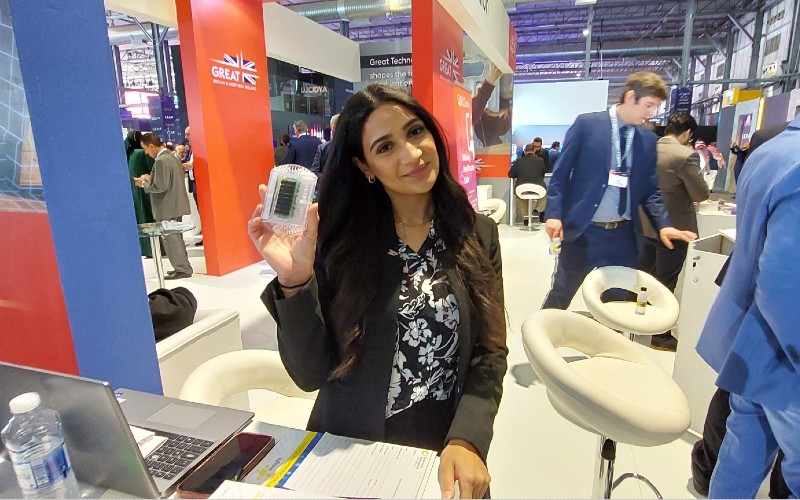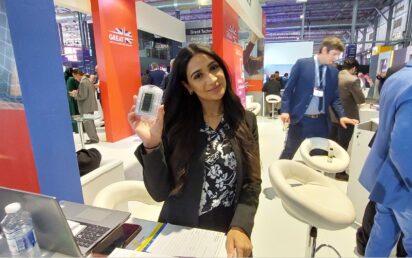When it comes to tech exhibitions, it takes something special to outdo Vegas’s Consumer Electronics Show.
LEAP, held earlier this month outside the Saudi capital Riyadh, is now claiming to be the world’s largest technology event by attendance. An estimated 172,000 people over four days – 57,000 more than CES in January – were there to make connections and take in new technologies.
Clearview Intelligence
Among the exhibitors at the second edition of LEAP were a number of UK-headquartered businesses. Nora Ali (pictured), international channel manager at Milton Keynes-based Clearview Intelligence, said she was on the lookout for new markets.
“A lot of our business in Europe is through well-established partners, long-term relationships,” she explained to BusinessCloud. “We also do a lot of international business in Africa, Asia and America – but much of it is transactional.
“My wish is to find new [international] partners here and establish relationships with them.”
The TransportTech company, which also has offices in Glasgow and Ayr in Scotland, employs 50 people and has built a data management platform alongside physical hardware – including solar panels for emitting LED lighting on roads.
“We’ve been able to increase delineation by 10 times and improve safety on the roads by 70%,” Ali tells us. “We can measure traffic flow, including pedestrians and cyclists; we can also monitor air quality and noise pollution.”
New computer vision tech will, when applied to cameras, be capable of event detection and vehicle classification.
“This is my first time in Saudi. It is definitely not what I thought it would be – it’s very vibrant and super fun,” adds Ali.
“I will say, though, that there is a lot of traffic… I feel like we could definitely have some more of our solutions here! I’m interested in the Saudi market as there’s a lot of sun.”

Universal Quantum
Also in the British pavilion was Mark Webber, quantum architecture lead at Universal Quantum.
The firm, headquartered near Brighton but with 40 employees around the world, is a trailblazer in quantum computing.
“It’s a new paradigm of doing computation,” says Webber. “With classical computing, you can only have zeroes and ones; quantum computing harnesses the new rules of quantum mechanics to do computation much more efficiently.
“There are different hardware platforms being pursued. Our company pursues trapped ions: literally trapping individual atoms, which each represent a qubit, within a vacuum that is lower in pressure than the depths of outer space. We literally move these atoms around to manipulate them; we shoot lasers and global microwave fields at these things to perform logical operations.
“For example, in quantum chemistry we’re going to be able to design new molecules for pharmacy and new materials for material science.”
He adds: “One of my focuses is security: there are certain encryption techniques that are commonly used which will eventually become vulnerable to a large enough quantum computer. Understanding that timeline and the mitigation is a big focus of a lot of people in the community right now.”
On his experience in Saudi Arabia, he said: “It’s been amazing so far; it’s my first time here. On Sunday we went to the Edge of the World, a grand cliffscape – I’d recommend that!”
Digis Squared
Nearby, Yasser Elsabrouty, co-founder of Digis Squared and MD for Saudi Arabia, told us that “there is a lot of potential here”.
The London-headquartered company specialises in managed services, system integration and consultancy to transform telecom networks. In around seven years it has grown to almost 300 employees with bases in Egypt, Angola and Dubai – and now Riyadh – despite being entirely self-funded.
“We started business development here in the last two years, and even during Coronavirus we did decent business,” he said. “We decided to come here officially and open an office because the potential size of the opportunity is huge, and all the new technologies are coming here.
“Also, there is a very good relationship and cooperation between the UK and Saudi Arabia. The Department for International Trade helped us a lot in setting up the office.”
Elsabrouty adds: “There are multiple challenges in building a business: one of these is connections. You need to make the right connection, to put your portfolio forward and to present it well.
“Also, if you have the right talents and resources, you can succeed. But if you don’t, you will face a lot of issues. Finding the right resources in all our locations was a challenge.”
Conix AI
Another UK business founded by Egyptian nationals is Conix AI. Co-founder and chief commercial officer Hani Farrag, manning a stand in the startup zone, explained how it reduces the architectural design process to minutes.
“We are a PropTech but are more like a DesignTech – we do architecture design using AI,” he said. “The time that an architect would need to design a house, using traditional techniques and tools, is three to four weeks. We do it in three to four minutes! We do everything from small houses to urban design.”
The company is based in Harrow, London, with a team in Cairo. Farrag says most of its 12 employees are architects with an AI and software development background.
“It is not a traditional machine learning model: the randomisation in our algorithm gives us an innovative design every time, at every single cycle of the design process,” he said. “We target mainly real estate developers and architects.”
Conix AI raised $1.3 million from Saudi VC Business Innovation Mine in November. Its focus is on the country after it signed a deal with a real estate developer for 2,200 units in northeast Riyadh. “We offered them 10 detailed designs in one day – usually an architect will take three to four weeks to come up with a single design!” he claimed.
“It was a ‘wow’ moment for them to see an engine that can generate these designs in just a few minutes.
“We’re focused mainly on Saudi Arabia because the boom in real estate development here over the next five to six years is going to be one of the highest in the world.”
Conix AI’s tech checks that designs comply with local regulations, so customers can submit designs for planning permission “immediately”.
“Currently, what we do through the engine is a 2D plan. Very soon we will add the facades as well – the 3D plans and working drawings for plumbing, electricity and mechanics. We will also offer rendering in real time, in partnership with NVIDIA Unreal Engine.”
FACIA

London-based facial biometric authentication solution FACIA was only founded last year but already has 50 staff with a development office in Pakistan.
Daniyal Chughtai (above), co-founder and CTO, said it raised around $1.5m from a UK-based investor last month.
“Any person can record a video of a face on a mobile phone and try to bypass security using that – but our system would not allow it,” he says of the first stage of its tech. “Our AI models calculate the depth and the skin tone of the face and hence can verify whether the person is real or fake.
“We can then detect documents and recognise the faces on them, matching them with our real faces.”
Chughtai, who likens Riyadh to Dubai, attended LEAP to access “networking opportunities and clients… people who can help us reach the next level”.
He added: “All the MENA region governments are here; enterprise-level products and companies; all different sorts of people.
“We’re very open to expanding all over the world: irrespective of biases in race, gender, age. But we’re launching from the UK first.
“This year and next we’re planning to expand to the European market and then slowly go into the African, Chinese and East Asian markets, and then obviously US, Canada and Australia as well.”

